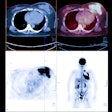A bill introduced into the U.S. House of Representatives this month will authorize the U.S. Department of Energy (DoE) to spend $163 million over the next five years toward the eventual production of molybdenum-99 (Mo-99) in the U.S.
The American Medical Isotopes Production Act (HR 3276) would require the DoE to use the funds to support private-sector or research-sector projects to establish Mo-99 production with low-enriched uranium. It also would allow the DoE to assist in the development of fuels, targets, and processes for Mo-99 production in the U.S.
The bill was introduced last week by U.S. Rep. Edward Markey (D-MA), chairman of the House Energy and Commerce Committee's subcommittee on energy and the environment. It is cosponsored by Rep. Fred Upton (R-MI), the ranking member of the subcommittee. The legislation has been referred to the House Committee on Energy and Commerce.
In a written statement, Markey noted that the U.S. is "facing a crisis in nuclear medicine. Because of serious technical problems in other countries, 50,000 critical procedures performed in this country every day will soon vanish.... We cannot afford to have American patients held hostage to old and faulty nuclear reactors in other countries.
The bill also would amend the current U.S. nuclear nonproliferation law by prohibiting, in seven to 10 years, the export of high-enriched uranium for medical isotope production. High-enriched uranium can be used to make a nuclear bomb, which, in turn, could threaten U.S. security.
Medical isotopes can be manufactured with low-enriched uranium with no loss in efficacy. Earlier this year, the National Academy of Sciences (NAS) released a study that concluded that adequate quantities of medical isotopes can be produced with low-enriched uranium.
The legislation comes as global Mo-99 supplies are strained due, in part, to the temporary shutdown of Atomic Energy of Canada's (AECL) nuclear reactor in Chalk River, Ontario, in May. AECL currently is repairing the facility and does not expect the 50-year-old reactor to come back online until late this year. The reactor provides 50% of the U.S. supply of Mo-99, which is the precursor to technetium-99, a commonly used radioisotope for nuclear cardiac imaging and other applications.
Adding to the crisis, the annual summer shutdown of the High Flux Reactor in Petten, Netherlands, began this month. The reactor's operator, the Nuclear Research and Consultancy Group (NRG), is performing regular preventive maintenance, testing, and inspection on the unit until August 18.
The High Flux Reactor is one of the key global suppliers of medical isotopes. Hazelwood, MO-based Mallinckrodt, a subsidiary of Covidien of Dublin, Ireland, is a joint venture partner with NRG at Petten. Mallinckrodt provides approximately 40% of the U.S. medical isotope supply.
By Wayne Forrest
AuntMinnie.com staff writer
July 28, 2009
Related Reading
U.S. government to intervene for Mo-99, July 10, 2009
AECL: Chalk River will not be online before late 2009, July 9, 2009
MDS urges Canada to complete Maple project, July 9, 2009
Canada still unsure on isotope reactor repair plan, June 26, 2009
Canada may open isotope project to private sector, June 19, 2009
Copyright © 2009 AuntMinnie.com




















